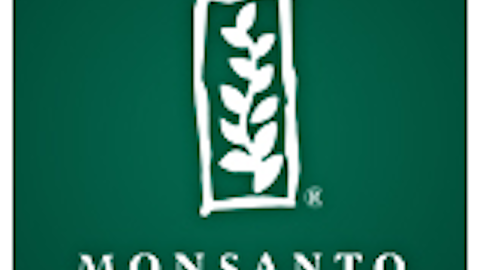The world population is expected to increase from 7 billion in 2012 to about 7.2 billion in 2014. With the increase in population, the global demand for agricultural products is on the rise. To increase the quantity of the agricultural produce, the quality of soil needs to be enhanced by efficient farming practices. This creates a huge opportunity for fertilizer companies.
Looking at these opportunities in the agricultural sector, I have chosen three companies that are using advanced technologies to produce high quality fertilizers to increase their market share.
Creating a monopoly
Genuity Roundup Ready 2 Yield is designed to provide farmers additional herbicide tolerant soybean, and Genuity Roundup Ready 2 Xtend provides the highest production opportunity to produce more beans. Under the deal, Monsanto Company (NYSE:MON) will also have access to DuPont Fabros Technology, Inc. (NYSE:DFT)’s disease-resistant and corn-defoliation patents.
Monsanto Company (NYSE:MON) generates 60% of its revenue from genetically modified organisms, or GMO seeds. In GMO, the DNA of a seed is modified to produce a high-yielding, fertile plant. The crops grown from GMO seeds are considered unhealthy, but the company has the shield of the Monsanto Company (NYSE:MON) Protection Act, which prevents the U.S. government from banning the consumption of genetically modified crops.
The company’s total revenue increased by 15% year-over-year to $5.47 billion in the quarter ending February 2013, which was mainly driven by the sales of GMO seeds in emerging markets like Brazil, Argentina, and other Latin American countries. In a one-year period, the company has witnessed an increase of 14% in the total annual revenue of $13.5 billion in the fiscal year 2012, with the help of the GMO segment.
On the path of continuous growth
Cargill witnessed 1% year-over-year increase in its total revenue, amounting to $32.2 billion in the third-quarter of 2013, and had reported 12% year-over-year increase in revenue, which totaled $133.9 billion in the fiscal year 2012. The earnings of Mosaic Co (NYSE:MOS)’s investors are expected to increase after the acquisition.
Furthermore, there is an expectation that Potash Corp./Saskatchewan (USA) (NYSE:POT) sales will rise to more than 2.3 million tons in the fourth quarter of 2013, from 1.8 million tons in the third quarter. This increase is driven by the global potash demand, most of which is coming from India and China. India has lowered its subsidy for potash, as the Indian currency is continuously falling. Still, the country cannot reduce its demand, as potash is needed for growing wheat, rice, and sugarcane, of which India is the second largest producer. In order to meet the growing demand, Mosaic Co (NYSE:MOS) has planned to spend $2 billion for expanding its production capacity of potash by 2 million tons every year at its Belle Plaine mine and Colonsay mine, located near Regina and Saskatoon.




